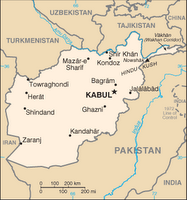Hard Earned Policy Lessons
 I recently finished Rory Stewart's Places in Between, a book chronicling his 600 mile walk across the width of Afghanistan (from Herat to Kabul). The story itself is interesting for the sheer adventure of walking across a foreign country alone, just weeks after the fall of the Taliban, across an inhospitable moutainous terrain in the winter.
I recently finished Rory Stewart's Places in Between, a book chronicling his 600 mile walk across the width of Afghanistan (from Herat to Kabul). The story itself is interesting for the sheer adventure of walking across a foreign country alone, just weeks after the fall of the Taliban, across an inhospitable moutainous terrain in the winter.But the book is really more than just a travelogue, providing interesting insights into a country that most Americans know little about, despite the fact that we have committed resources to invading and "democratizing" the nation. While our "defeat" of the Taliban may be perceived by us as a victory for democracy over terrorism, it is just another of a series of violent conflicts that the Afghans have endured for decades. There is no joy among the remote Afghan villagers for the Taliban defeat, as they struggle with illiteracy, drought, famine, and demographic and economic destruction from previous foreign and domestic conflicts.
 What I found most enlightening about Stewart's insights was the complex interactions among harsh geographies, competing ethnic rivalries, and feudal social classes that make it difficult to even conceive of "nationhood" or "democracy" in the isolated mountain villages that comprise much of Afghanistan. The priorities and loyalties of most rural Afghans are so far removed from those articulated by American politicians or even American-supported leaders in Afghanistan. It's unfortunate that Stewart couldn't have taken Condoleeza Rice, Donald Rumsfeld, or even Hamid Karzai along with him.
What I found most enlightening about Stewart's insights was the complex interactions among harsh geographies, competing ethnic rivalries, and feudal social classes that make it difficult to even conceive of "nationhood" or "democracy" in the isolated mountain villages that comprise much of Afghanistan. The priorities and loyalties of most rural Afghans are so far removed from those articulated by American politicians or even American-supported leaders in Afghanistan. It's unfortunate that Stewart couldn't have taken Condoleeza Rice, Donald Rumsfeld, or even Hamid Karzai along with him.
0 Comments:
Post a Comment
<< Home